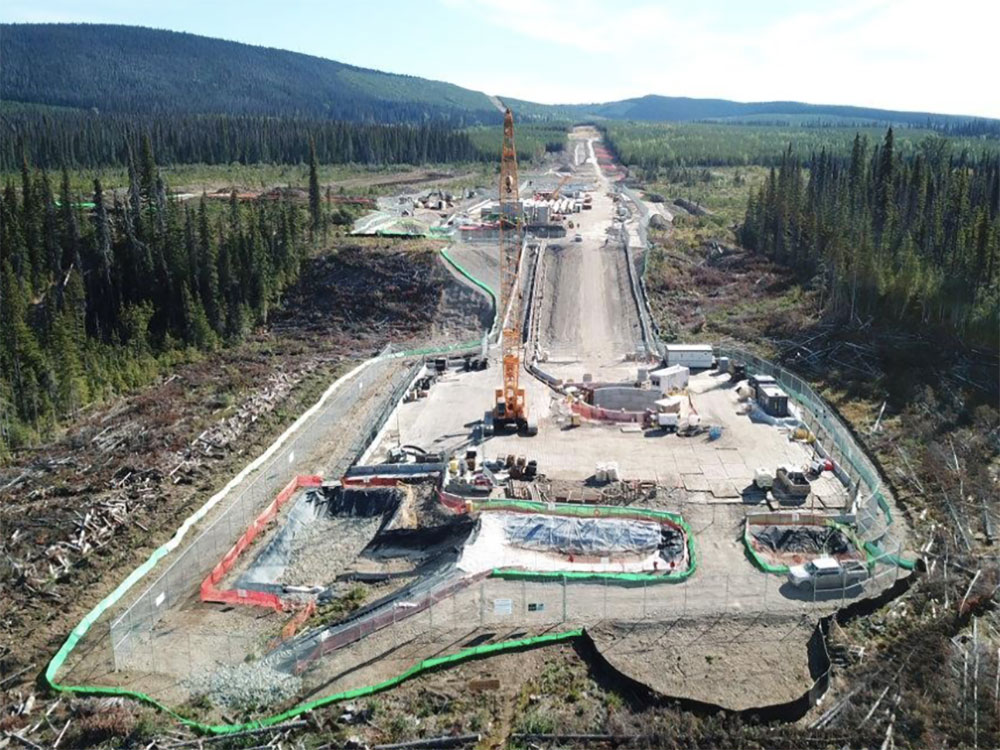As Coastal GasLink drills under the Wedzin Kwa (Morice River), I have been reflecting on my visit to Wet’suwet’en territory this summer. My colleague, Green MLA Adam Olsen, and I had the great honour of being invited to the territory as guests and witnesses.
During our visit we rafted down the Wedzin Kwa, a river that has nurtured and sustained the Wet’suwet’en people since time immemorial. We marvelled at the grandeur of the headwaters and drank straight from the clear, clean river.
As I write this, salmon are spawning in that river. Countless eggs — an entire generation of salmon — have been laid in the riverbed gravel. And Coastal GasLink is drilling a massive borehole within 12 metres of those salmon eggs.
The potential impacts of drilling on these salmon eggs are unclear. What is clear is that Coastal GasLink cannot be trusted to safeguard the Wedzin Kwa and the surrounding environment.
The company has an egregious track record. Coastal GasLink has damaged wetlands, rivers and lakes along the $11-billion pipeline route — a pipeline that aims to transport fracked gas from northeast B.C. to LNG Canada in Kitimat.
Since construction began in 2019 the company has been issued 51 warnings, 16 orders and two fines by the BC Environmental Assessment Office for repeated non-compliance related to erosion and sediment control.
In the legislature we called on the government to issue a stop-work order to Coastal GasLink. We sought this due to the company’s extensive history of environmental violations and to ensure construction does not further imperil sensitive fish habitat.
On Oct. 14 the Environmental Assessment Office ordered Coastal GasLink to stop construction in areas covered by a compliance agreement between the company and the office.
The order was vague and unclear. Currently, it’s uncertain whether this order prevents the company from drilling under the river while salmon are spawning.
The government has tools to keep Coastal GasLink in compliance, and they are choosing not to use them. Until Coastal GasLink can demonstrate in good faith that it can construct this pipeline in a manner that is safe for the public and the environment, it should not be allowed to proceed.
That’s why we are reiterating our call for the government to issue a stop-work order to Coastal GasLink.
To be clear, we have never supported — and will never support — the Coastal GasLink project. The project is unjustifiable. It does not have the free, prior and informed consent of the Wet'suwet'en Hereditary Chiefs. It is infrastructure that facilitates increased fossil fuel production during a climate emergency. It imperils one of the last clean sources of drinking water and salmon spawning grounds in the territory.
While rafting down the Wedzin Kwa, the reverence we felt for the river was in stark contrast to the intense surveillance and security we experienced at the hands of the RCMP, its community-industry response group and industry. Everywhere we went on the territory as invited guests of Hereditary Chiefs, we were surveilled, filmed and watched. I was stunned to witness how government protects industry. I was stunned to see how taxpayer dollars are funding this failure of leadership.
This government ultimately shows its priorities by how it spends its money. When Coastal GasLink damaged habitat during pipeline construction they were fined a mere $240,000. Meanwhile, the government has handed the LNG industry billions in subsidies. They have spent more than $25 million criminalizing and surveilling Wet’suwet’en people and fighting Hereditary Chiefs who have already established their authority at the Supreme Court of Canada. They sent officers with assault rifles to arrest Chiefs and Elders.
This government’s surveillance and criminalization of Indigenous peoples is indefensible. These tactics are appalling when the government has committed to protect the rights of Indigenous peoples.
The Wet’suwet’en Hereditary Chiefs provided Coastal GasLink and the government with an alternate route for the pipeline. There was always another way — a way without violence or trespass. But Coastal GasLink and the province chose this path, the path of most resistance.
I learned recently that surveillance and security is ramping up yet again, and that Indigenous people are being detained and harassed as they try to access their own territory.
What if the government enforced environmental rules and regulations as robustly as they enforced RCMP patrols and surveillance tactics on Wet’suwet’en people on their own territory?
Considering the harms Coastal GasLink has done to waterways and ecosystems along the pipeline route, why is this government spending its resources on protecting the company’s interests, rather than the public interest? Imagine if they spent the subsidies they give the LNG industry on health care, on protecting salmon, on local clean energy projects?
Salmon are critical to the culture, ecology and economy of northwest B.C. They contribute hundreds of millions of dollars annually to the regional economy and provide food, ceremonial and economic benefits to First Nations. Salmon already face many obstacles — drought, climate change, poor forestry practices and habitat loss — and now Coastal GasLink is drilling and blasting under their spawning beds.
The government has a duty to properly enforce regulations and laws and protect the environment. The government must ensure one of the most sensitive and productive waterways in the country, and one of the largest intact spawning areas in the Skeena River watershed, will not be harmed by a company with an egregious history of environmental violations.
Salmon, the natural environment, and the Supreme Court-defined rights of the Wet’suwet’en peoples deserve the same level of protection as the government extends to Coastal GasLink. ![]()
Read more: Indigenous, Energy, BC Politics, Environment
















Tyee Commenting Guidelines
Comments that violate guidelines risk being deleted, and violations may result in a temporary or permanent user ban. Maintain the spirit of good conversation to stay in the discussion.
*Please note The Tyee is not a forum for spreading misinformation about COVID-19, denying its existence or minimizing its risk to public health.
Do:
Do not: